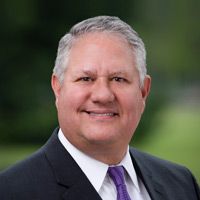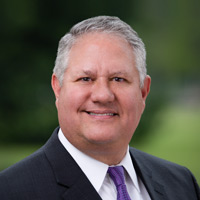Your Estate Could Have a Serious Password Problem
Estate administration in the digital age requires having a strategy to share passwords to your computer, email and online accounts. Without that, things quickly get complicated.


Profit and prosper with the best of Kiplinger's advice on investing, taxes, retirement, personal finance and much more. Delivered daily. Enter your email in the box and click Sign Me Up.
You are now subscribed
Your newsletter sign-up was successful
Want to add more newsletters?

Delivered daily
Kiplinger Today
Profit and prosper with the best of Kiplinger's advice on investing, taxes, retirement, personal finance and much more delivered daily. Smart money moves start here.

Sent five days a week
Kiplinger A Step Ahead
Get practical help to make better financial decisions in your everyday life, from spending to savings on top deals.

Delivered daily
Kiplinger Closing Bell
Get today's biggest financial and investing headlines delivered to your inbox every day the U.S. stock market is open.

Sent twice a week
Kiplinger Adviser Intel
Financial pros across the country share best practices and fresh tactics to preserve and grow your wealth.

Delivered weekly
Kiplinger Tax Tips
Trim your federal and state tax bills with practical tax-planning and tax-cutting strategies.

Sent twice a week
Kiplinger Retirement Tips
Your twice-a-week guide to planning and enjoying a financially secure and richly rewarding retirement

Sent bimonthly.
Kiplinger Adviser Angle
Insights for advisers, wealth managers and other financial professionals.

Sent twice a week
Kiplinger Investing Weekly
Your twice-a-week roundup of promising stocks, funds, companies and industries you should consider, ones you should avoid, and why.

Sent weekly for six weeks
Kiplinger Invest for Retirement
Your step-by-step six-part series on how to invest for retirement, from devising a successful strategy to exactly which investments to choose.
When I was a young trust officer just getting started in this business 30-some years ago, estate administration was a much simpler process. Not only have estate planning techniques become more complex, but the way an executor gathers information about a decedent’s assets has changed entirely.
Back when I started, a change-of-address card was sent to the post office and the decedent’s mail began coming to my office. I would simply wait until I received the person’s bank statements, brokerage statements and any other notifications, such as property tax statements or insurance premium notices.
However, times have changed, and now many customers receive financial statements electronically instead of on paper. Having online access to investments is a great convenience for us all, allowing us to check balances, place trades, transfer funds and a whole litany of other services that not long ago required the help of another human being. The downside to these advancements is that they can create a very difficult situation for a surviving spouse or executor trying to determine where the assets of a deceased person are held.
From just $107.88 $24.99 for Kiplinger Personal Finance
Become a smarter, better informed investor. Subscribe from just $107.88 $24.99, plus get up to 4 Special Issues

Sign up for Kiplinger’s Free Newsletters
Profit and prosper with the best of expert advice on investing, taxes, retirement, personal finance and more - straight to your e-mail.
Profit and prosper with the best of expert advice - straight to your e-mail.
Complicating things even more are the complex passwords that are now common to access our computers, not to mention our online financial accounts. What is the first thing you are told about any password? Do not write it down! Again, this can create unintended consequences for an executor who needs to gain access to each account in order to marshal the assets and eventually distribute those assets to the heirs or trustees based on the language contained in the will.
This issue was recently in the news when the founder and CEO of a Canadian cryptocurrency exchange, QuadrigaCX, died unexpectedly in December of 2018. Gerry Cotten died having not shared the password to the exchange’s cold storage locker, leaving $190 million in cryptocurrency belonging to the clients of QuadrigaCX totally inaccessible. Investors may never see their funds again. This is a very eye-opening example of how the security system designed to keep hackers out of an account can work against the owners of funds. It is unclear if the cryptocurrency held in the QuadrigaCX secure cold storage wallet will ever be recovered — and some have suggested that this story was devised to conceal financial wrongdoing on the part of QuadrigaCX’s founder.
This is a very public and large-scale example of secure access, but it does highlight the need to provide a way for someone to access your data if you become incapacitated or pass away. There is no simple answer to this problem, but it is clear the issue isn’t going away anytime soon. There are some actions you can take to help ensure that your assets and financial statements are accessible to your executor or surviving spouse in the event you die or become incapacitated.
The easiest, but least secure, is to simply provide your passwords to a trusted family member. They will need passwords to access your computer or smartphone. They will also need a password to access your email — which is where electronic financial statements are traditionally sent. As mentioned, this creates a potential security issue and also doesn’t provide the trusted person with access to each individual financial platform, which would require each of those passwords to be written down or somehow saved and communicated to the trusted person. Many computer operating systems now save passwords to frequently visited websites, so it is possible that if a trusted person had access to your computer, they may also be able to gain access to your financial accounts.
Another simple option would be to write down and place all passwords in a safe deposit box. Your executor or guardian/attorney-in-fact through a power of attorney (in the case of incapacitation) can gain access to the safe deposit box and your passwords to access your computer, email and financial platforms. This option is somewhat safer than simply writing down and providing passwords to a trusted friend or spouse; however, it requires diligence to keep the list updated, as passwords change. It has been my experience that most people will not keep up with this burdensome process, and the passwords kept in a safe deposit box are almost always outdated. However, it is a way to provide access to your information if you are disciplined enough to keep the list current.
Lastly, the most secure and by far the most recommended way to safely and securely store passwords is the use of a digital wallet. Like a real wallet, a digital wallet keeps track of all your passwords across all your devices and does so in an encrypted file in the cloud. My favorite digital wallet is Last Pass (www.lastpass.com), but there are many others from which to choose. LastPass is a free app that allows you to safely and securely save all your passwords in a single place. Therefore, there is only one hurdle for an executor or surviving spouse to get over, and that is the password with which you access the digital wallet.
This would require that you keep a record of the master password somewhere, or perhaps you can agree with your spouse or trusted friend on a pattern of passwords. That could be anything that the two of you can easily remember, along with perhaps a few other characters. It will need to be something that can be remembered and not written down. Writing down and saving passwords should be avoided if at all possible.
As we continue to progress down this digital path, I believe there will soon be an even easier way to store and recover passwords to enable access to your financial data by either a spouse or executor in the event it is necessary to obtain the information. However, for now, I encourage you to engage in some strategy to ensure that your assets can be found, gathered and distributed per your wishes when the inevitable occurs.
Profit and prosper with the best of Kiplinger's advice on investing, taxes, retirement, personal finance and much more. Delivered daily. Enter your email in the box and click Sign Me Up.

David E. Redding, Market President and Senior Wealth Advisor at Argent Trust Company, helps clients navigate the complex world of estate planning, trust administration, wealth transfer and closely held business strategies. His 30 years of experience in the industry give him a depth and understanding to tackle real life problems faced by high net worth families as they plan for the transition of business interests and wealth to future generations.
-
 Quiz: Do You Know How to Avoid the "Medigap Trap?"
Quiz: Do You Know How to Avoid the "Medigap Trap?"Quiz Test your basic knowledge of the "Medigap Trap" in our quick quiz.
-
 5 Top Tax-Efficient Mutual Funds for Smarter Investing
5 Top Tax-Efficient Mutual Funds for Smarter InvestingMutual funds are many things, but "tax-friendly" usually isn't one of them. These are the exceptions.
-
 AI Sparks Existential Crisis for Software Stocks
AI Sparks Existential Crisis for Software StocksThe Kiplinger Letter Fears that SaaS subscription software could be rendered obsolete by artificial intelligence make investors jittery.
-
 Social Security Break-Even Math Is Helpful, But Don't Let It Dictate When You'll File
Social Security Break-Even Math Is Helpful, But Don't Let It Dictate When You'll FileYour Social Security break-even age tells you how long you'd need to live for delaying to pay off, but shouldn't be the sole basis for deciding when to claim.
-
 I'm an Opportunity Zone Pro: This Is How to Deliver Roth-Like Tax-Free Growth (Without Contribution Limits)
I'm an Opportunity Zone Pro: This Is How to Deliver Roth-Like Tax-Free Growth (Without Contribution Limits)Investors who combine Roth IRAs, the gold standard of tax-free savings, with qualified opportunity funds could enjoy decades of tax-free growth.
-
 One of the Most Powerful Wealth-Building Moves a Woman Can Make: A Midcareer Pivot
One of the Most Powerful Wealth-Building Moves a Woman Can Make: A Midcareer PivotIf it feels like you can't sustain what you're doing for the next 20 years, it's time for an honest look at what's draining you and what energizes you.
-
 I'm a Wealth Adviser Obsessed With Mahjong: Here Are 8 Ways It Can Teach Us How to Manage Our Money
I'm a Wealth Adviser Obsessed With Mahjong: Here Are 8 Ways It Can Teach Us How to Manage Our MoneyThis increasingly popular Chinese game can teach us not only how to help manage our money but also how important it is to connect with other people.
-
 Looking for a Financial Book That Won't Put Your Young Adult to Sleep? This One Makes 'Cents'
Looking for a Financial Book That Won't Put Your Young Adult to Sleep? This One Makes 'Cents'"Wealth Your Way" by Cosmo DeStefano offers a highly accessible guide for young adults and their parents on building wealth through simple, consistent habits.
-
 Global Uncertainty Has Investors Running Scared: This Is How Advisers Can Reassure Them
Global Uncertainty Has Investors Running Scared: This Is How Advisers Can Reassure ThemHow can advisers reassure clients nervous about their plans in an increasingly complex and rapidly changing world? This conversational framework provides the key.
-
 I'm a Real Estate Investing Pro: This Is How to Use 1031 Exchanges to Scale Up Your Real Estate Empire
I'm a Real Estate Investing Pro: This Is How to Use 1031 Exchanges to Scale Up Your Real Estate EmpireSmall rental properties can be excellent investments, but you can use 1031 exchanges to transition to commercial real estate for bigger wealth-building.
-
 Should You Jump on the Roth Conversion Bandwagon? A Financial Adviser Weighs In
Should You Jump on the Roth Conversion Bandwagon? A Financial Adviser Weighs InRoth conversions are all the rage, but what works well for one household can cause financial strain for another. This is what you should consider before moving ahead.